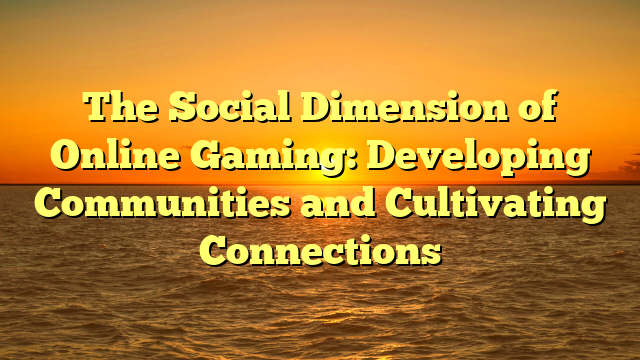
Introduction
On-line gaming has been through a remarkable transformation more than the past many years. What began as simple multiplayer experiences in local area systems (LANs) has exploded in a vast, interconnected universe where gamers from around the globe can socialize, compete, and collaborate in real-time. This specific evolution has not necessarily only changed just how we play childish games nevertheless also how we all socialize, compete, and even even perceive digital worlds. On this page, many of us explore the voyage of online game playing, its current scenery, and what the future holds.
The Early Days: LAN Functions and Basic Multiplayer
In the late 20th hundred years, online gaming was a niche leisure activity primarily confined to lovers who hosted LOCAL AREA NETWORK parties. These get-togethers involved connecting multiple computers in just a local network to learn video games like Doom, Go pitapat, and StarCraft. When limited by technological innovation, these events fostered strong communities and even laid the foot work for future developments in multiplayer gaming.
The Rise regarding Broadband and On-line Platforms
The creation of broadband internet within the early 2000s was a game-changer. It enabled more stable and faster connections, making genuine online multiplayer experiences feasible. Platforms just like Xbox Live plus PlayStation Network appeared, providing centralized hubs for gamers to be able to connect, compete, and even communicate. Simultaneously, PERSONAL COMPUTER gaming saw the rise of providers like Steam, which not only provided game distribution and also integrated multiplayer uses, achievements, and group features.
Massively Multiplayer Online Games (MMOs) Take Center Period
The mid-2000s seen the explosion involving Massively Multiplayer On the web (MMO) games. Games like World of Warcraft, EVE Online, and Guild Wars created continual virtual worlds where thousands of gamers could interact concurrently. These games highlighted long-term engagement, social interaction, and complicated economies, setting innovative standards for precisely what online games could attain.
The present day Landscape: Esports, Mobile Gaming, plus Social Integration
Today, online gaming involves a diverse range of genres and even platforms. Esports offers transformed competitive video gaming into a global phenomenon, with specialized players, large-scale tournaments, and substantial winning prize pools. Mobile gambling has democratized access, allowing millions to be able to play anywhere, at any time. Additionally, Opatoto as tone chat, streaming integrations, and in-game internet sites have made game playing a much more immersive in addition to interactive experience.
Seeking Ahead: The Metaverse and Beyond
The future of on the internet gaming is intertwined with the idea of the metaverse—a collective virtual contributed space integrating increased reality (AR), online reality (VR), and chronic online environments. Firms like Epic Game titles, Roblox, and Fb (Meta) are investing heavily in developing expansive, interconnected online worlds where video gaming is just one particular facet of a wider digital existence. Improvements in AI, cloud computing, and 5G technology will further enhance these experience, making the line between the virtual and even real worlds significantly blurred.
Realization
From humble beginnings found in local networks to be able to the expansive, interconnected metaverse of nowadays, online gaming has continually evolved, powered by technological developments as well as the unyielding imagination of developers in addition to players alike. Since we look to typically the future, the probable for online games seems boundless, encouraging even more immersive, interactive, and socially rich experiences with regard to gamers around typically the world.

